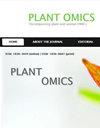蔗糖代谢蛋白在甜高粱耐高渗胁迫中的作用
Q3 Agricultural and Biological Sciences
引用次数: 2
摘要
糖积累是干旱胁迫条件下常见的代谢反应。然而,对胁迫下糖积累的潜在分子机制的研究仍然有限。本研究探讨了蔗糖代谢蛋白在高粱对干旱诱导的高渗胁迫的耐受性以及最终的渗透调节中的作用。研究了胁迫对糖含量、酶活性和基因表达的影响。不同耐旱性的甜高粱品种(ICSV213和ICSB338)经受了10天的亏水期。糖度分析表明,两个品种在水分胁迫条件下总可溶性糖含量均升高,其中ICSV213的糖度含量高于ICSB338。高效液相色谱分析表明,两个品种的蔗糖含量降低,葡萄糖和果糖浓度增加,ICSV213显示出较高的己糖含量。2个品种的蔗糖转化酶、蔗糖磷酸合酶和蔗糖合酶活性均在胁迫下升高,其中ICSV213的蔗糖转化酶活性高于其他蔗糖代谢酶。胁迫条件下,ICSV213转化酶和蔗糖磷酸合酶(SPS)基因转录表达量显著上调,而蔗糖合酶(Susy)转录表达量则维持在较低水平。从高粱品种ICSV213获得的数据表明,高渗胁迫耐受性与溶质和蔗糖代谢蛋白的积累有关。因此,品种ICSV213可能是未来开发耐高渗胁迫甜高粱的优良靶点。本文章由计算机程序翻译,如有差异,请以英文原文为准。
The role of sucrose metabolizing proteins in hyperosmotic stress tolerance in sweet sorghum (Sorghum bicolor L. Moench)
Sugar accumulation is a common metabolic response under drought stress conditions. However, studies on the underlying molecular mechanisms of sugar accumulation under stress remain restricted. This study explores the role of sucrose metabolizing proteins in conferring tolerance to drought-induced hyperosmotic stress, and ultimately osmotic adjustment in sorghum. The effect of stress on sugar content, enzyme activity and gene expression was investigated. Sweet sorghum varieties (ICSV213 and ICSB338) differing in levels of drought tolerance were subjected to a 10-day water deficit period. Brix plant sap analysis indicated elevated total soluble sugar levels under water stress conditions in both varieties with ICSV213 demonstrating a higher brix content than ICSB338. HPLC analysis gave a decrease in sucrose levels and an increase in glucose and fructose concentrations in both varieties with ICSV213 demonstrating higher hexose levels. Enzyme activity levels of invertase, sucrose phosphate synthase and sucrose synthase were found to increase under stress in both varieties with ICSV213 invertase displaying the highest activity when compared to other sucrose metabolizing enzymes. Transcriptional expression of invertase and sucrose phosphate synthase (SPS) genes was significantly up regulated in ICSV213 under stressed conditions, whereas sucrose synthase (Susy) levels remained low in both varieties. Data obtained for sorghum variety ICSV213 points towards a relationship between hyperosmotic stress tolerance and the accumulation of solutes and sucrose metabolism proteins. Consequently variety ICSV213 may therefore be an excellent target for future development of hyperosmotic stress tolerant sweet sorghum.
求助全文
通过发布文献求助,成功后即可免费获取论文全文。
去求助
来源期刊

Plant Omics
生物-植物科学
CiteScore
1.30
自引率
0.00%
发文量
0
审稿时长
6 months
期刊介绍:
Plant OMICS is an international, peer-reviewed publication that gathers and disseminates fundamental and applied knowledge in almost all area of molecular plant and animal biology, particularly OMICS-es including:
Coverage extends to the most corners of plant and animal biology, including molecular biology, genetics, functional and non-functional molecular breeding and physiology, developmental biology, and new technologies such as vaccines. This journal also covers the combination of many areas of molecular plant and animal biology. Plant Omics is also exteremely interested in molecular aspects of stress biology in plants and animals, including molecular physiology.
 求助内容:
求助内容: 应助结果提醒方式:
应助结果提醒方式:


